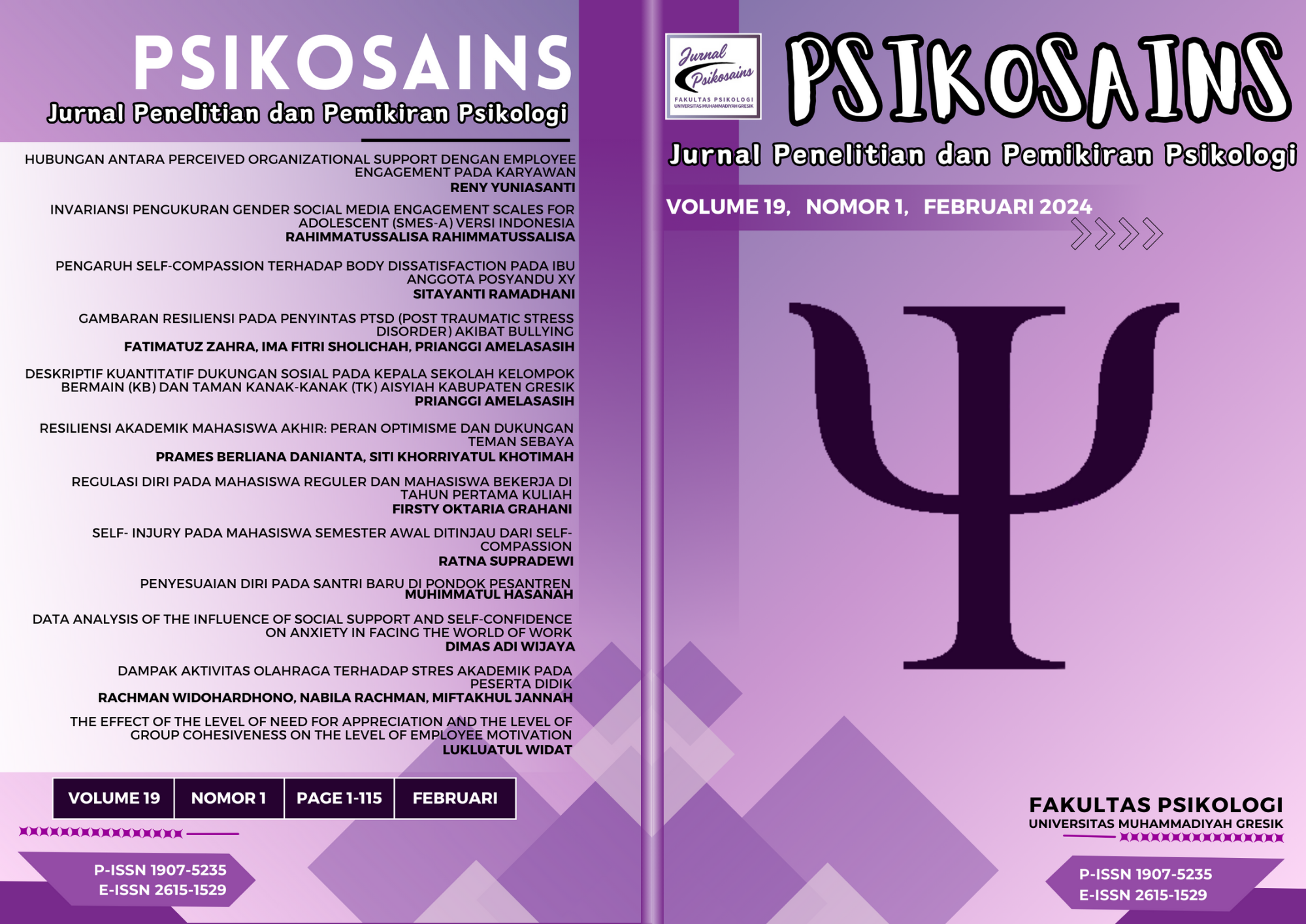PENYESUAIAN DIRI PADA SANTRI BARU DI PONDOK PESANTREN
DOI:
https://doi.org/10.30587/psikosains.v19i1.7289Keywords:
Self-Adjustment, Student, Islamic Boarding SchoolAbstract
Background: Students' lives in pesantren are very different from their lives at
home, and they need to adjust to survive until the end of the study period. The
strict schedule has a further impact on children's lives. The many activities are
also a problem for some students to adjust to boarding school life. Objective: The
purpose of the study is to find out how santri adjust to boarding school activities,
as well as the types of behavior shown by new santri in adjusting to their new
environment and boarding school activities. Method: This research uses a type
of qualitative research with a case study approach. Data analysis techniques use
the Miles and Huberman interactive model. Result: The results showed that new
santri need motivation from themselves, family, and the environment to be able
to adjust more easily. New students find it difficult to adjust only at the beginning
of entering the dormitory. Conclusion: New students overcome this problem by
building good relationships with the dormitory environment such as making
friends with fellow new students, administrators, and the surrounding
community.
References
Kaitanya Dengan Konsep Diri Dan Penyesuaian Diri Pada Remaja). Edisi
Kedua. Bandung: PT Refika Aditama.
Ahyani, L. N. & Kumalasari. F (2012). Hubungan Antara Dukungan Sosial Dengan Penyesuaian Diri Remaja di Panti Asuhan. Jurnal Penelitian. Kudus: Universitas Muria Kudus.
Chemers, M. M., Hu, L.-t., & Garcia, B. F. (2001). Academic self-efficacy and first year college student performance and adjustment. Journal of Educational Psychology, 93(1), 55–64. https://doi.org/10.1037/0022-0663.93.1.55
Clinciu, A. I. (2013). Adaptation and Stress For The First Year University Students. Procedia-social and behavioral sciences, 78, 718-722. https://doi.org/10.1016/j.sbspro.2013.04.382
Creswell, John W. (2015). Penelitian Kualitatif & Desain Riset. Yogyakarta:
Pustaka Pelajar.
Desmita. (2009). Psikologi Perkembangan Peserta Didik. Bandung: Remaja Rosdakarya.
Dodds A. G., Ferguson E., Ng L., Flannigan H., Hawes L., & Yates L. (1994). The concept of adjustment: A structural model. Journal of Visual Impairment & Blindness, 88, 487–497.
Esmael, A., Ebrahim, J., & Ekulinet, M. (2018). Adjustment Problem among First Year University Students in Ethiopia: Across Secrional Survey 21:5 Journal of Psychiatry. DOI: 10.4172/2378- 5756.1000455.
Fatimah, E. (2010). Psikologi Perkembangan (Perkembangan Peserta Didik).
Bandung: Pustaka Setia.
Gerungan, (2004). Psikologi Sosial. Bandung: Rafika Aditama.
Hurlock, E, B. (2017). Psikologi Perkembangan Suatu Pendekatan SepanjangRentang Kehidupan (edisi ke – 5). Jakarta: Erlangga.
Santrock, J., W. (2003). Adolescence Perkembangan Remaja. Edisi Keenam. Jakarta: Erlangga.
Schneiders, A. A. (1964). Personal Adjustment and Mental Health. New York:
Holt, Rinehart & Winston.
Yudrik, Jahja. (2017). Psikologi Perkembangan. Jakarta: Prenada Media.



